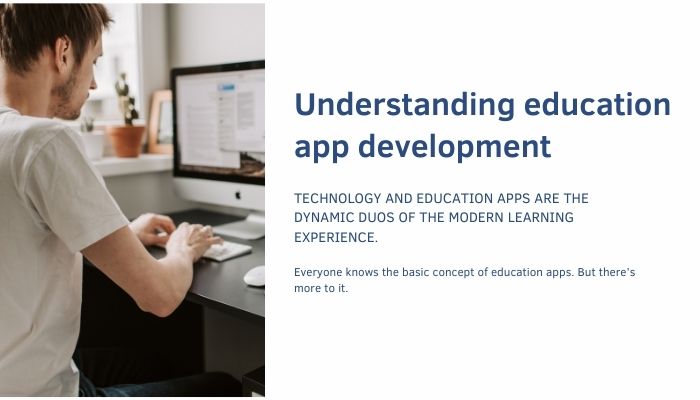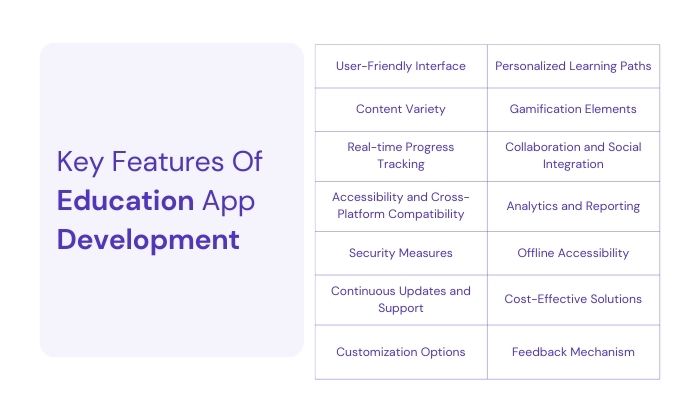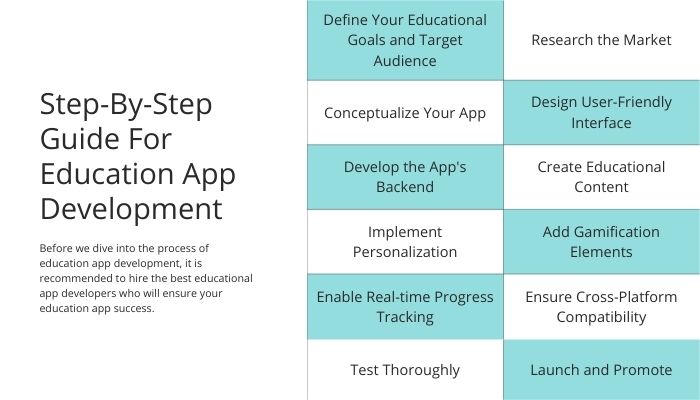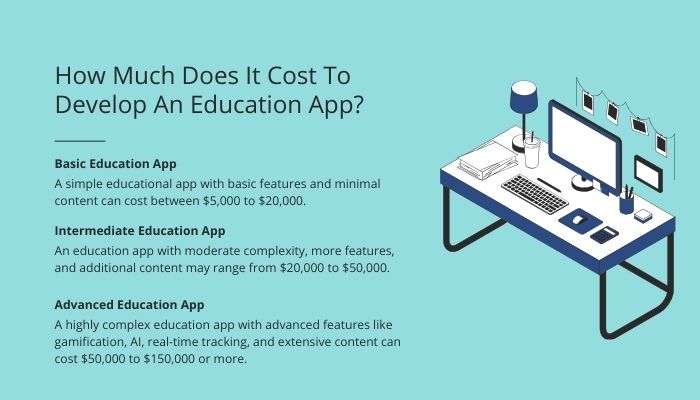Table of Contents
Learning is no longer confined to the classroom; education apps bring the classroom to you.
The way we engage with educational content is rapidly evolving, the Education apps have emerged as powerful tools to enhance learning experiences, making education more accessible, interactive, and tailored to user needs.
Whether you are an educator looking to transform the education market or want to dive into the most profitable niche, understanding the ins and outs of educational app development is essential.
Moreover, the education market is the second largest market on the Play Store and third on the Apple App Store. In the generation of TikTok and Instagram, Gen Z is most likely to use education apps.
So it’s the right time to invest in the education app development as the education market is expected to show an annual growth rate of 10.39% and project market volume of US$9.55 by 2027.
However, the market is filled with the best education apps like Babbel, Google Classroom, Duolingo, and many others. They are best for everyone!
With so many apps available in the market, there is always room for the best service provider. So without further ado, let’s dive into the guide to educational app development, its types, features & cost.
Educational App Development: Market Insights

The COVID-19 pandemic has accelerated the adoption of eLearning. Even as traditional classrooms reopen, the blend of in-person and online learning, known as hybrid learning, is likely to remain a significant trend.
Moreover, businesses recognize the value of eLearning for employee training and development. The corporate eLearning sector is expected to grow as companies invest in upskilling and reskilling their workforce.
Is education a profitable market?
Yes, here’s why:
- The education market has generated revenue of $370 Bn by 2026
- McKinsey reports shows that students in the US more than 60 minutes per week on devices achieved higher academic results.
- The game-based learning market is expected to grow 20% per year through 2025
And 80% of college students accept that the Edtech apps help them to improve their grades.
Understanding Educational App Development

Technology and education apps are the dynamic duos of the modern learning experience.
Everyone knows the basic concept of education apps. But there’s more to it.
Educational apps are catalysts for a transformative learning experience, catering to a broad spectrum of educational needs. When you develop an educational app, it requires a clear vision, understanding of user requirements, and a commitment to delivering high-quality content.
As the educational landscape continues to evolve, educational app development stands at the forefront, shaping the future of learning and teaching.
Moreover, technology has become a driving force, reshaping the way we learn and teach. Central to this digital transformation are education apps, powerful tools that bridge the gap between traditional and modern learning methods. However, to harness the potential of educational app development, it’s essential to comprehend the various types of education apps available.
Types of Educational Apps
| 01. Learning Management System (LMS) | Organizing and managing course content, assignments, and assessments. |
| 02. eLearning Apps | Delivering interactive and multimedia-rich lessons, often with a focus on online courses. |
| 03. Language learning apps | Facilitating language acquisition through interactive lessons, quizzes, and practice exercises. |
| 04. Skill development apps | Enhancing specific skills, such as coding, cooking, or music, through tutorials and hands-on practice |
| 05. Educational gaming apps | Combining learning with entertainment through gamification to make learning fun and engaging. |
| 06. Exam preparation apps | Providing practice tests, flashcards, and study materials to prepare students for exams. |
| 07. Interactive eBooks | Enriching traditional textbooks with multimedia elements like videos, animations, and quizzes. |
| 08. Note-taking and productivity apps | Streamlining note-taking, task management, and organization for students and professionals. |
What are the key features of an Educational App?

Educational app development has redefined traditional learning methods. And education app developers cater to diverse educational needs and preferences while keeping learners engaged. Let’s delve into the key features that make these apps stand out.
01. User-Friendly Interface
First of all, a user-friendly interface is the cornerstone of any successful education app Intuitive navigation, clean design, and easy accessibility are essential to ensure that users of all ages and backgrounds can navigate the app effortlessly.
However, by using app design tools and experienced designers you don’t have to worry about interface.
02. Personalized Learning Paths
One-size-fits-all learning is a thing of the past.
Educational apps offer personalized learning paths, adapting to the individual needs and pace of each student. This feature ensures that learners get the most out of their educational experience.
03. Content Variety
Some free education apps provide access to a vast array of educational content. From text-based lessons to interactive videos, quizzes, and simulations, these apps offer a diverse range of learning materials to cater to different learning styles. With an Android app design guide, one can provide variety in content.
04. Gamification Elements
Gamification elements, such as badges, rewards, and leaderboards, make learning fun and engaging. These features motivate students to complete tasks, set goals, and track their progress.
05. Real-time Progress Tracking
Educational apps allow learners to track their progress in real time. They can monitor their performance, identify areas where they need improvement, and set achievable goals to enhance their learning journey.
06. Collaboration and Social Integration
Collaboration is a vital aspect of modern education.
Many educational apps facilitate collaborative learning by integrating features like group discussions, peer reviews, and social sharing, fostering a sense of community among learners.
07. Accessibility and Cross-Platform Compatibility
Educational apps are designed to be accessible on various devices, including smartphones, tablets, and desktops. Plus, the cross-platform compatibility ensures that learners can access their educational content anytime, anywhere.
08. Analytics and Reporting
Educators and administrators benefit from analytics and reporting features. These tools provide insights into student performance, allowing them to make data-driven decisions to enhance the overall learning experience.
09. Security Measures
Security is paramount when it comes to education apps for kids, especially when dealing with sensitive student data.
However, robust security measures, including data encryption and user authentication, are implemented to protect user information.
10. Offline Accessibility
Not all learners have constant internet access. Educational apps often include offline mode, enabling users to download content and continue learning even without an internet connection.
11. Continuous Updates and Support
To stay relevant and effective, educational apps require regular updates and technical support. This ensures that users have access to the latest features and bug fixes, creating a seamless learning experience.
12. Cost-Effective Solutions
Education apps offer a cost-effective alternative to traditional classroom learning. They reduce the need for physical textbooks and other materials while providing a wealth of digital resources.
13. Customization Options
Education apps and Google apps for education often allow institutions to customize the platform to suit their specific needs. This flexibility is particularly valuable for schools, colleges, and universities.
14. Feedback Mechanism
A feedback mechanism is crucial for improving educational apps continuously. Users can provide feedback on their experiences, helping developers make necessary enhancements so that apps do not get rejected by Apple.
Step-By-Step Guide For Educational App Development

Before we dive into the process of educational app development, it is recommended to hire the best educational app developers who will ensure your educational app success.
Step 01: Define Your Educational Goals and Target Audience
Now before diving into development, outline your educational objectives by determining the age group and educational level of your target audience. Also, understanding your goals and audience will shape your app’s design and content.
Step 02: Research the Market
Conduct thorough market research to identify gaps and opportunities in the education app market. Analyze competitors, their strengths, weaknesses, and user reviews. This research will help you position your app effectively.
Step 03: Conceptualize Your App
Brainstorm and create a clear concept for your educational app.
Therefore, decide on the type of content you’ll offer, such as courses, quizzes, or interactive lessons. Lastly, define the app’s unique selling points (USPs) that will set it apart from competitors. After that hire an app designer for creating a user-friendly interface.
Step 04: Design User-Friendly Interface
Now, hire a skilled UI/UX designer to create an intuitive and visually appealing user interface (UI). Ensure that the app is easy to navigate, with clear menus, buttons, and a pleasing layout.
Step 05: Develop the App’s Backend
Work with experienced developers to build the backend of your app.
Moreover, choose the right technology stack and database systems to support the app’s functionality. Plus, ensure data security measures are in place.
Step 06: Create Educational Content
Develop educational content that aligns with your app’s goals. This could include text, images, videos, quizzes, and interactive exercises. Additionally, ensure the content is engaging and adheres to educational standards.
Step 07: Implement Personalization
Integrate algorithms that personalize the learning experience for each user. Consider adaptive learning, which adjusts content based on a user’s progress and preferences.
Step 08: Add Gamification Elements
Incorporate gamification features like badges, rewards, and leaderboards to motivate learners and make the app more engaging.
Step 09: Enable Real-time Progress Tracking
Implement tracking and analytics tools to allow users to monitor their progress in real time. Provide feedback and recommendations to help learners improve.
Step 10: Ensure Cross-Platform Compatibility
Develop your app to work seamlessly on various platforms and devices, including smartphones, tablets, and desktops.
Step 11: Test Thoroughly
Lastly, perform extensive testing to identify and fix bugs, glitches, and usability issues. Conduct user testing to gather feedback for improvements.
Step 12: Launch and Promote
Once your app is polished and ready, launch it on app stores like Google Play and Apple App Store. Create a marketing plan to promote your app through social media, educational forums, and other channels.
How Much Does It Cost To Develop An Educational App?

The cost to develop an educationa app can vary widely depending on several factors, including the complexity of the app, the platform it’s built for the features it offers, and the location of the development team. Here is a breakdown of costs providing a rough estimate:
-
Basic Educational App
A simple educational app with basic features and minimal content can cost between $5,000 to $20,000.
-
Intermediate Educational App
An educational app with moderate complexity, more features, and additional content may range from $20,000 to $50,000.
-
Advanced Educational App
A highly complex educational app with advanced features like gamification, AI, real-time tracking, and extensive content can cost $50,000 to $150,000 or more.
Overall, it’s important to note that these are ballpark figures, and the actual cost can vary significantly based on your specific requirements, the development team’s rates, and other factors. Additionally, ongoing maintenance and updates will incur additional costs beyond the initial development.
Conclusion
Educational app development is not about coding and design, it’s about empowering individuals to acquire knowledge efficiently, engage with interactive content, & foster a lifelong love for learning.
In the end, the journey of education app development is not just about creating a piece of software’s about creating a tool that can transform lives, & open doors to a world of knowledge. If you are willing to invest in educational app development, contact an expert mobile app development company in USA.





No Comments
Comments are closed.